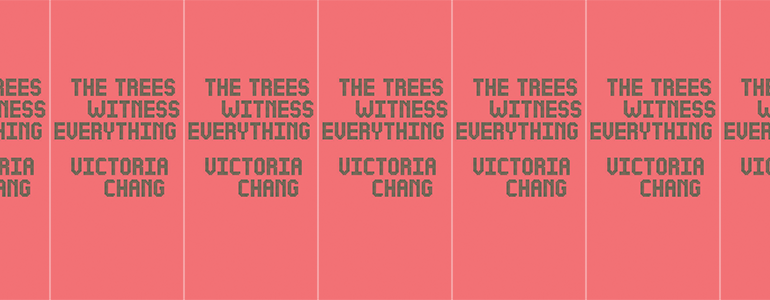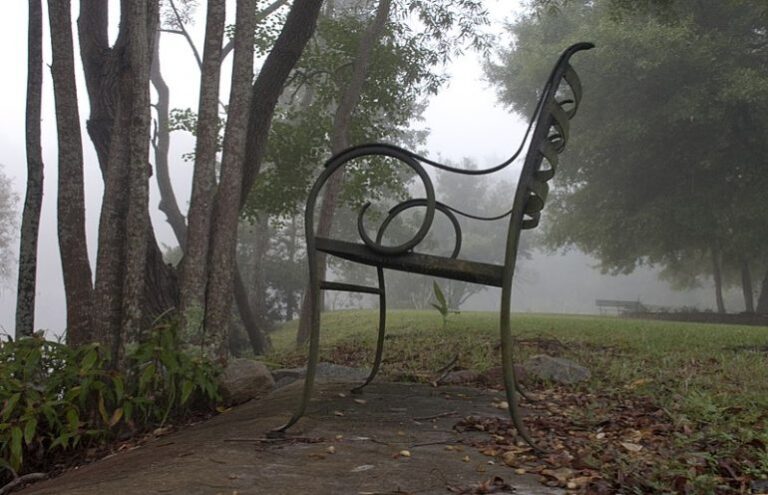W. S. Merwin’s Ancestral Memory in Victoria Chang’s The Trees Witness Everything

We exist in a world dependent on cycles. Every day the tides commit themselves to a pattern of rising and falling, the moon never wavers from its orbit and its phases, and the days shift slowly through the seasons. We pay our rent and our mortgages in cycles. We do our dishes and our laundry. Every day is a process of waking, living, and sleeping. It is impossible for us to avoid the repetition. To live into the future, we must be willing to start each day, each month, each year again, from the beginning.
Victoria Chang understands this. Her last two books, Obit (2020) and Dear, Memory: Letters on Writing, Silence, and Grief (2021), have tenderly explored the cycle of grief, reflecting on her parents, her family, and her former selves in ways that are both new and revelatory but also continuations of the same conversation—which is, of course, itself a cycle. In her latest book of poems, The Trees Witness Everything, out today, Chang continues to plumb the depths of grief while also making space to acknowledge the cycles of life and nature.
The poems that make up The Trees Witness Everything are unique—the majority of them are written in the form of wakas, Japanese poems that adhere to various basic patterns and syllabic structures—but they are also acutely tied to the work of another poet, W. S. Merwin. Merwin was an extremely prolific poet. Known for his eventual signature style of choosing to never use punctuation in his verse, he typically explores people’s relationships to one another and to the natural world. Nature, in Merwin’s poems, is passively omniscient. It governs our large egos, taking care to avoid giving any of us special treatment. It is the thing that understands us completely, even if we fail to understand it just as well. To read a Merwin poem is to take note of your own smallness, acknowledging all that has come before you and all that will come after. This emphasis on a before and after is evocative of a cycle—the circle of life, if you will—and Merwin, just like Chang, seems to believe in the idea that history and life are really just ongoing cycles designed to propel us forward, just as they also keep us tied to our pasts.
Almost every poem in Chang’s The Trees Witness Everything gets its title from a Merwin poem of the same name. In the book’s endnotes, Chang explains this impulse by claiming that she “selected Merwin’s titles because of how open they seem.” And indeed, with titles as simple as “Horses” and “Snowfall,” a lot of room opens for Chang to step in and continue the conversation. Chang also explains that she usually read the Merwin poem first before writing her own version, but not always, which is an important thing to keep in mind when we are thinking about the dialogue that naturally springs up between these two poets throughout the course of Chang’s book because it is true that a conversation is created here, whether Merwin is aware of it or not.
To me, Merwin’s understanding of the cycle of time can best be described as a reliance on ancestral memory. He puts a lot of weight into the concept of ancestors and the personal histories that are attached to them. In his poem “To Ashes,” he speaks to a “you” about this continuation of history when he says, “those circling ages dancing / in flames as we see now / afterward / here before you.” He cleverly conflates both the past and the present here in order to achieve a lack of distance between the two. In quick succession, we have the words “now,” “afterward,” “here,” and “before,” centering us in the present moment while simultaneously reminding us of the past. The “ages dancing in flames” seem to circle around us, gone but not forgotten. And then Merwin reminds us that we, too, are like this. “O you with no / beginning that we can conceive of / no end that we can foresee / you of whom once we were made,” he writes. We become snakes eating ourselves, continuing a cycle of birth, death, and rebirth that will carry on ad infinitum. The “circling ages” are our histories, our ancestors, and we are the conduits through which their stories will continue to be told.
Chang responds to Merwin’s idea of ancestral memory in her own version of “To Ashes.” Here, though, the symbol of the ash from a burning fire has been replaced with the very literal image of Chang’s mother’s own ashes. “I have forgotten / where my mother’s ashes are. / I think they are flushed / into the earth.” she writes. For Chang, the memory of her mother and her mother’s body is tactile, no longer Merwin’s symbolic rendering of unnamed generations from the past and future. But it is also something that has slipped through her fingers and back into the soil of the earth. Her mother no longer belongs to Chang but has instead returned to the land from which she came. “How many ashes / do I walk through in one day? / I have forgotten,” she muses, and suddenly the ground underneath our feet becomes nothing more than a graveyard of all the people who have come before us. Like Merwin, Chang conceives of a world where those who have died in the past still exist with us into today and into the future. In the poem “The Old Room,” Chang writes, “The past is never finished, / the future is sacred.”
The idea that all life is a cycle isn’t necessarily a new concept, but Merwin and Chang seem to argue that humans have lost sight of this cycle. These days, we seem to only be tasked with moving forward in time, failing to recognize the influence of the past. In his poem “Witness,” Merwin writes, “I want to tell what the forests / were like // I will have to speak / in a forgotten language.” Here, the present does not allow for a discussion of the past unless you are able to remember how to communicate with it. Chang echoes this idea in one of her versions of “Witness”—the second of two in her book—when she writes, “Maybe nothing dies, / things just get lost. Memory.” Her line break signifies that it is our memory of the past that we fail to maintain, a past memory that is not only of the things that happened to us when we were younger, but also of the things that happened before we were even born. We have forgotten how to speak the languages of the past, and therefore have forgotten how to exist within the natural cycle of life and death. We see ourselves as nothing more than a continuation, an everlasting forward momentum into the brightness that we perceive to be our futures.
By choosing to write poems that can be seen as a response to Merwin’s poems of the same names, Chang has chosen to restore order to the cyclical idea of ancestral memory. Merwin, who died in 2019, is a voice speaking to her from the past. She, by choosing to interact with his work, is starting, perhaps even continuing, a conversation with history. Though they are not related by family, they are tied to each another through shared ideas and the writing of poems. Merwin eventually chose to stop using punctuation in his poetry; this choice is also cyclical in nature, as each poem has no true beginning or ending. Chang, on the other hand, does utilize punctuation throughout her verse, but by consciously making the choice to work within the constraints present in The Trees Witness Everything, she is also working to restore order to the cycle. We must return to the conventions of the past if we are to eventually move forward and create something new.
In the middle of The Trees Witness Everything is the poem “Marfa, Texas.” Composed of stanzas with seemingly no specific structure or pattern, this long poem follows Chang as she continues to contemplate the themes of grief and what it means to live. It is a beautifully rendered section in an already beautiful book, and it is full of moments that are meant to reinforce the cyclical nature of our lives and our ancestors. “The lightning has barely / changed. It’s the same lightning / from our childhoods,” she writes, drawing attention to the stability of nature and its ability to remain consistent and present through time. The poem ends on a melancholic note, a pondering that both suggests a way forward but also a way to better understand our place in the natural cycle of things. Chang writes, “Maybe we aren’t meant to / remember anything here. Just / meant to see. And to forget.” And suddenly the cycle, Merwin’s cyclical dependance on those who have come before and those who will come after, becomes clear, our presence on this earth just another small moment in a larger, ongoing conversation.


